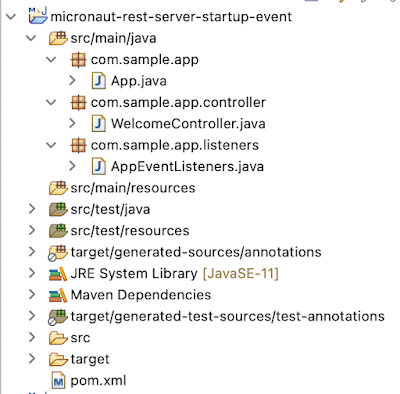By listening on 'ServerStartupEvent', we can execute the code when the server completes startup.
Example
@Singleton
public class AppEventListeners {
@Inject
EmbeddedServer embeddedServer;
@EventListener
public void onStartup(ServerStartupEvent event) {
System.out.println("host : " + embeddedServer.getHost());
System.out.println("port : " + embeddedServer.getPort());
}
}
Find the below working application.
Step 1: Create new maven project ‘micronaut-rest-server-startup-event’.
Step 2: Update pom.xml with maven dependencies.
pom.xml
<?xml version="1.0" encoding="UTF-8"?>
<project xmlns="http://maven.apache.org/POM/4.0.0"
xmlns:xsi="http://www.w3.org/2001/XMLSchema-instance"
xsi:schemaLocation="http://maven.apache.org/POM/4.0.0 http://maven.apache.org/xsd/maven-4.0.0.xsd">
<modelVersion>4.0.0</modelVersion>
<groupId>com.sample.app</groupId>
<artifactId>micronaut-rest-server-startup-event</artifactId>
<version>0.1</version>
<packaging>jar</packaging>
<parent>
<groupId>io.micronaut</groupId>
<artifactId>micronaut-parent</artifactId>
<version>3.7.4</version>
</parent>
<properties>
<packaging>jar</packaging>
<jdk.version>11</jdk.version>
<release.version>11</release.version>
<micronaut.version>3.7.3</micronaut.version>
<micronaut.runtime>netty</micronaut.runtime>
<exec.mainClass>com.sample.app.App</exec.mainClass>
</properties>
<repositories>
<repository>
<id>central</id>
<url>https://repo.maven.apache.org/maven2</url>
</repository>
</repositories>
<dependencies>
<dependency>
<groupId>io.micronaut</groupId>
<artifactId>micronaut-inject</artifactId>
<scope>compile</scope>
</dependency>
<dependency>
<groupId>io.micronaut</groupId>
<artifactId>micronaut-validation</artifactId>
<scope>compile</scope>
</dependency>
<dependency>
<groupId>io.micronaut</groupId>
<artifactId>micronaut-http-client</artifactId>
<scope>compile</scope>
</dependency>
<dependency>
<groupId>io.micronaut</groupId>
<artifactId>micronaut-http-server-netty</artifactId>
<scope>compile</scope>
</dependency>
<dependency>
<groupId>io.micronaut</groupId>
<artifactId>micronaut-jackson-databind</artifactId>
<scope>compile</scope>
</dependency>
<dependency>
<groupId>jakarta.annotation</groupId>
<artifactId>jakarta.annotation-api</artifactId>
<scope>compile</scope>
</dependency>
<dependency>
<groupId>ch.qos.logback</groupId>
<artifactId>logback-classic</artifactId>
<scope>runtime</scope>
</dependency>
<dependency>
<groupId>io.micronaut.test</groupId>
<artifactId>micronaut-test-junit5</artifactId>
<scope>test</scope>
</dependency>
<dependency>
<groupId>org.junit.jupiter</groupId>
<artifactId>junit-jupiter-api</artifactId>
<scope>test</scope>
</dependency>
<dependency>
<groupId>org.junit.jupiter</groupId>
<artifactId>junit-jupiter-engine</artifactId>
<scope>test</scope>
</dependency>
</dependencies>
<build>
<plugins>
<plugin>
<groupId>io.micronaut.build</groupId>
<artifactId>micronaut-maven-plugin</artifactId>
</plugin>
<plugin>
<groupId>org.apache.maven.plugins</groupId>
<artifactId>maven-compiler-plugin</artifactId>
<configuration>
<!-- Uncomment to enable incremental compilation -->
<!-- <useIncrementalCompilation>false</useIncrementalCompilation> -->
<annotationProcessorPaths
combine.children="append">
<path>
<groupId>io.micronaut</groupId>
<artifactId>micronaut-http-validation</artifactId>
<version>${micronaut.version}</version>
</path>
</annotationProcessorPaths>
</configuration>
</plugin>
</plugins>
</build>
</project>
Step 3: Define AppEventListeners class.
AppEventListeners.java
package com.sample.app.listeners;
import io.micronaut.runtime.event.annotation.EventListener;
import io.micronaut.runtime.server.EmbeddedServer;
import io.micronaut.runtime.server.event.ServerStartupEvent;
import jakarta.inject.Inject;
import jakarta.inject.Singleton;
@Singleton
public class AppEventListeners {
@Inject
EmbeddedServer embeddedServer;
@EventListener
public void onStartup(ServerStartupEvent event) {
System.out.println("host : " + embeddedServer.getHost());
System.out.println("port : " + embeddedServer.getPort());
}
}
Step 4: Define WelcomeController class.
WelcomeController.java
package com.sample.app.controller;
import io.micronaut.http.MediaType;
import io.micronaut.http.annotation.Controller;
import io.micronaut.http.annotation.Get;
@Controller("/welcome")
public class WelcomeController {
@Get(produces = MediaType.TEXT_PLAIN)
public String index() {
return "Welcome to Micronaut app!!!!";
}
}
Step 5: Define main application class.
App.java
package com.sample.app;
import io.micronaut.runtime.Micronaut;
public class App {
public static void main(String[] args) {
Micronaut.run(App.class);
}
}
Total project structure looks like below.
Build the project using mvn package command.
Navigate to the folder where pom.xml is located and execute the command ‘mvn package’.
Upon command successful execution, you can see the jar file ‘micronaut-rest-server-startup-event-0.1.jar’ in project target folder.
$ls ./target
classes
generated-sources
generated-test-sources
maven-archiver
maven-status
micronaut-rest-server-startup-event-0.1.jar
original-micronaut-rest-server-startup-event-0.1.jar
test-classes
Execute below command to run the application.
java -jar ./target/micronaut-rest-server-startup-event-0.1.jar
You will see the server host and port details in the console.
host : localhost port : 8080
You can download this application from this link.
Previous Next Home
No comments:
Post a Comment